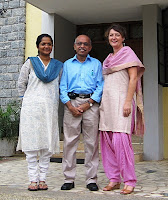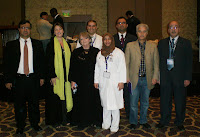


 I am writing this from a snowy and beautiful Scotland where temperatures staying well below zero and the contrast dramatic with the equatorial warmth of Uganda.I made it home despite the travel chaos in the UK to celebrate Christmas with my family. I am listening to all the familiar lyrics that are piped through our store and struck by 'all I want for Christmas is......' What do you want for Christmas? For many many people their wish and prayer is for pain relief; for accessible and affordable oral morphine. The good news is that our Mulago team last Friday had its first new supply of oral morphine liquid with heartfelt thanks to Hospice Africa Uganda and our Cairdeas appeal. I would have loved for you to see the smiles and the genuine relief as we were able to take the lurid green liquid (dyed that colour) on our ward round. You can see the delight on the face of Jo (our clinical lecturer) Francis (Degree student on placement) and Micheala (Swedish consultant volunteering for a month) and one of our nursing team, Harriet. The situation is not fully resolved but we now have morphine powder in country and hope to have the new system fully functional very soon. It made a very good reason to have a slice of Chrsitmas cake. You can see the blackboard behind with many many names; our current in patient list. What kind of difference does oral morphine make for people in pain? Let me introduce you to Mr Sandrerson, a skilled tailor who is the chairman of the home based care volunteers for the Bangwe team in Blantyre, Malawi and whose home I visited recently. Working alongside the palliative care team these volunteers are key in supporting people in their own communities. "If we don't work together with the nurses how can we help our patients? If we see someone in pain and don't have any painkillers, don't have any morphine, then we feel we have let them down and get discouraged.' Let me also take you on a brief ward round in Mulago; first to the Burns Unit. Here patients can have unimaginable pain but the staff are experienced in prescribing oral morphine. However, with the recent shortage many many patients had no effective analgesia. Elizabeth tells a harrowing story of a family member deliberately sabotaging her paraffin with petrol leading to an explosion that seriously burned her as well as her daughters (2 and 11)
I am writing this from a snowy and beautiful Scotland where temperatures staying well below zero and the contrast dramatic with the equatorial warmth of Uganda.I made it home despite the travel chaos in the UK to celebrate Christmas with my family. I am listening to all the familiar lyrics that are piped through our store and struck by 'all I want for Christmas is......' What do you want for Christmas? For many many people their wish and prayer is for pain relief; for accessible and affordable oral morphine. The good news is that our Mulago team last Friday had its first new supply of oral morphine liquid with heartfelt thanks to Hospice Africa Uganda and our Cairdeas appeal. I would have loved for you to see the smiles and the genuine relief as we were able to take the lurid green liquid (dyed that colour) on our ward round. You can see the delight on the face of Jo (our clinical lecturer) Francis (Degree student on placement) and Micheala (Swedish consultant volunteering for a month) and one of our nursing team, Harriet. The situation is not fully resolved but we now have morphine powder in country and hope to have the new system fully functional very soon. It made a very good reason to have a slice of Chrsitmas cake. You can see the blackboard behind with many many names; our current in patient list. What kind of difference does oral morphine make for people in pain? Let me introduce you to Mr Sandrerson, a skilled tailor who is the chairman of the home based care volunteers for the Bangwe team in Blantyre, Malawi and whose home I visited recently. Working alongside the palliative care team these volunteers are key in supporting people in their own communities. "If we don't work together with the nurses how can we help our patients? If we see someone in pain and don't have any painkillers, don't have any morphine, then we feel we have let them down and get discouraged.' Let me also take you on a brief ward round in Mulago; first to the Burns Unit. Here patients can have unimaginable pain but the staff are experienced in prescribing oral morphine. However, with the recent shortage many many patients had no effective analgesia. Elizabeth tells a harrowing story of a family member deliberately sabotaging her paraffin with petrol leading to an explosion that seriously burned her as well as her daughters (2 and 11) She has been in hospital for 2 months already for treatment but her pain had been severe with very little help. Now is is under control and she smiled 'I so appreciate your team visiting and bringing me morphine; thank you.' Richard is in a bed outside the ward because of the crowding and is swathed in bandages. Most of all he is worried about his wife who was injured when petrol was poured over them both and set alight. 'I used to dread the dressings being changed but now I can manage because you have brought me morphine; can you check if my wife has morphine too?' Lets go on to the orthopaedic wards and meet Wesley too; he is only 13 and had had major surgery for a tumour on his arm. His eyes dropped when we asked him what it was like to have severe pain and no morphine; 'I had no hope' he said, and then looked up with a shy smile, 'but now I have hope'.
She has been in hospital for 2 months already for treatment but her pain had been severe with very little help. Now is is under control and she smiled 'I so appreciate your team visiting and bringing me morphine; thank you.' Richard is in a bed outside the ward because of the crowding and is swathed in bandages. Most of all he is worried about his wife who was injured when petrol was poured over them both and set alight. 'I used to dread the dressings being changed but now I can manage because you have brought me morphine; can you check if my wife has morphine too?' Lets go on to the orthopaedic wards and meet Wesley too; he is only 13 and had had major surgery for a tumour on his arm. His eyes dropped when we asked him what it was like to have severe pain and no morphine; 'I had no hope' he said, and then looked up with a shy smile, 'but now I have hope'. I want to say a huge thank you for the support for our morphine appeal. We have almost reached our initial target and will be able to put any extra towards a scholarship to support the training of a nurse to prescribe morphine as part of our Degree programme. Thank you for helping us to bring hope to people like Wesley, Richard and Elizabeth. Whatever your are doing this Christmas and whatever you are longing for, we all at Cairdeas and in our team at Makerere university wish you peace and joy to you and yours; echoing the words of the angels that first Christmas; 'Glory to God in the highest; peace on earth and good will towards man.'






































